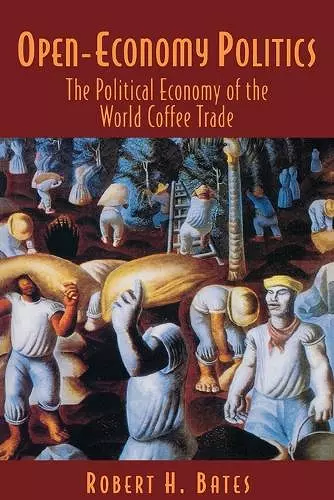Open-Economy Politics
The Political Economy of the World Coffee Trade
Format:Paperback
Publisher:Princeton University Press
Published:9th Mar '99
Should be back in stock very soon

Open-Economy Politics offers a brilliant, subtle, nuanced examination that will stimulate discussion and set an agenda for further research in comparative politics, international relations, and the growing interface between the two. Robert Bates addresses--with more empirical detail than anyone I know--how domestic institutions and alignments matter, what sustains or undermines international regimes, and when and how hegemons affect both. -- Ronald Rogowski, University of California, Los Angeles A marvelous story told in depth, woven with a dazzling array of data. Robert Bates sets out to span the international/domestic analytic divide in political science in a 'search for a framework for research into the politics of open economies.' He explores a wide variety of theoretical approaches to international political economy and advances, compellingly, his preferred approach: neo-institutionism. This book will be widely read. -- D. Michael Shafer, Rutgers University
Coffee is traded in one of the few international markets ever subject to effective political regulation. This work explores the origins, the operations, and the collapse of the International Coffee Organization, an international "government of coffee" that was formed in the 1960s. It is aimed at those interested in "the new institutionalism".Coffee is traded in one of the few international markets ever subject to effective political regulation. In Open-Economy Politics, Robert Bates explores the origins, the operations, and the collapse of the International Coffee Organization, an international "government of coffee" that was formed in the 1960s. In so doing, he addresses key issues in international political economy and comparative politics, and analyzes the creation of political institutions and their impact on markets. Drawing upon field work in East Africa, Colombia, and Brazil, Bates explores the domestic sources of international politics within a unique theoretical framework that blends game theoretic and more established approaches to the study of politics. The book will appeal to those interested in international political economy, comparative politics, and the political economy of development, especially in Latin America and Africa, and to readers wanting to learn more about the economic and political realities that underlie the coffee market. It is also must reading for those interested in "the new institutionalism" and modern political economy.
One of Choice's Outstanding Academic Titles for 1997 "[The] analysis is from the perspective of new institutional economics, as the book straddles the fault lines between, on the one hand, political developments in Brazil, Colombia, and the United States and, on the other, interest groups in those countries... Bates's approach is therefore innovative... The book is beautifully produced, full of useful data... It will provoke lively debate."--Robert G. Greenhill, Economic History Review "A no-nonsense academic study of the politics of coffee."--Charles Corn, Los Angeles Times Book Review
- Runner-up for Choice Magazine Outstanding Reference/Academic Book Award 1997
ISBN: 9780691005195
Dimensions: unknown
Weight: 340g
240 pages